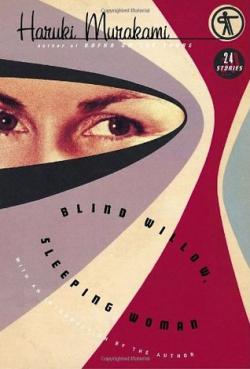Blind Willow, Sleeping Woman

By Haruki Murakami
Translated by Philip Gabriel and Jay Rubin
Vintage (2007)
ISBN-13: 978-0099512820
Review by Mikihiro Maeda
Haruki Murakami’s novels are translated into around forty languages. Murakami is one of the most famous living Japanese novelists, and at the same time he is a translator of American literature into Japanese, namely the works of F. Scott Fitzgerald, Truman Capote, John Irving and Raymond Carver. As many Japanese may know, his novel “Norwegian Wood” (Noruwei no Mori) was published in 1987, and this two-volume book has sold around eight million copies in both hard cover and paperback in Japan and has made him a national celebrity.
This book “Blind Willow, Sleeping Woman” is a collection of twenty-six short stories from the surreal to the mundane, some of which he wrote while staying at a U.S. university after the publication of “Norwegian Wood”. In 1981 he wrote ‘The Mirror’, ‘A Perfect Day for Kangaroos’, ‘Dabchick’, ‘The Year of Spaghetti’, and ‘The Rise and Fall of Sharpie Cakes.’ The final five stories, ‘Chance Traveller’, ‘Hanalei Bay’, ‘Where I’m Likely to Find It’, ‘The Kidney-Shaped Stone That Moves Every Day’ and ‘A Shinagawa Monkey’ appeared in the book “Strange Tales From Tokyo” (Tokyo Kitanshu), published in Japan in 2005. Although five stories share the same theme, each story can be read separately.
In the introduction of this book he described his short story writing style as follows: “I find writing novels a challenge, writing short stories a joy. If writing novels is like planting a forest, then writing short stories is more like planting a garden.” When he finished writing novels he wanted to write short stories, and once a group of short stories was finished he again focused on writing a long novel or he rewrote short stories and incorporated them into novels in some cases. ‘Firefly’ in this book was incorporated as parts of the long novel “Norwegian Wood,” and ‘Man-Eating Cats’ was “Sputnik Sweetheart” as readers may notice. And ‘Crabs’, ‘A Poor Aunt Story’, ‘Hunting Knife’ and ‘Blind Willow, Sleeping Woman’ have all been greatly revised before translation into English, so the versions published in Japan differ from the stories in this book. Before translation into English, Murakami also made minor changes to parts of stories with which he was not pleased.
Sometimes when Murakami writes a novel, he writes in English at first and then translates it into Japanese with the rhythms of jazz. According to the author, his English vocabulary is more limited than his Japanese vocabulary, so it is easy for him to write in simple sentences. Regarding the influence of jazz music, he ran a jazz bar in the western part of Tokyo with his wife for one year before graduation from Waseda University until he had to stop to concentrate on writing novels. So in his novels we can enjoy many famous jazz and popular western songs. I think one sentence in the introduction of this book should be introduced here: “An idea that springs up in your mind, a word, an image, whatever. In most cases it’s like jazz improvisation, with the story taking me where it wants to.”
It also should not be forgotten that Murakami is not a perfectionist about published translations of his works. He does not hesitate to publish a new book in foreign languages, even if the translated version is not perfect or is incomplete. He has said that it is much more important to publish in good time than to wait for the perfect version to come later. Some Japanese writers hesitate about whether their works should be translated into other languages, saying that the original Japanese meaning will not be conveyed accurately in other languages. But in this global age, those novels not translated are never read by foreigners. Novels should be translated into other languages to be read worldwide.
Why are his works loved by and attractive to so many readers not only in Japan but also in foreign countries, mainly in Taiwan and China? In one of his most famous novels, “The Wind-Up Bird Chronicle,” he examined the Manchuria incident, which occurred during World War II, and apparently he regrets the Japanese military action in China at that time. It appears that this is one of the reasons why Murakami is well accepted in Asian countries, mainly China. Moreover, in the day and age when Murakami was young it seems that people appreciated inner spiritual satisfaction much more than the materialism embraced these days.
“Blind Willow, Sleeping Woman” was the winner of the 11th annual Kiriyama Prize in 2007 and the Frank O’Connor International Short Story Award in September, 2006. Also, in 2006 Murakami received the Franz Kafka Prize (Czech Republic) for his novel “Kafka on the Shore (Umibe no Kafka).” Two recipients of this latter prize before him won the Nobel Prize for Literature, so it seems that Murakami will be a possible nominee for the Nobel Prize in the near future.
This review was produced in collaboration with Global Communications Platform and first published on the Platform: http://www.glocom.org/

